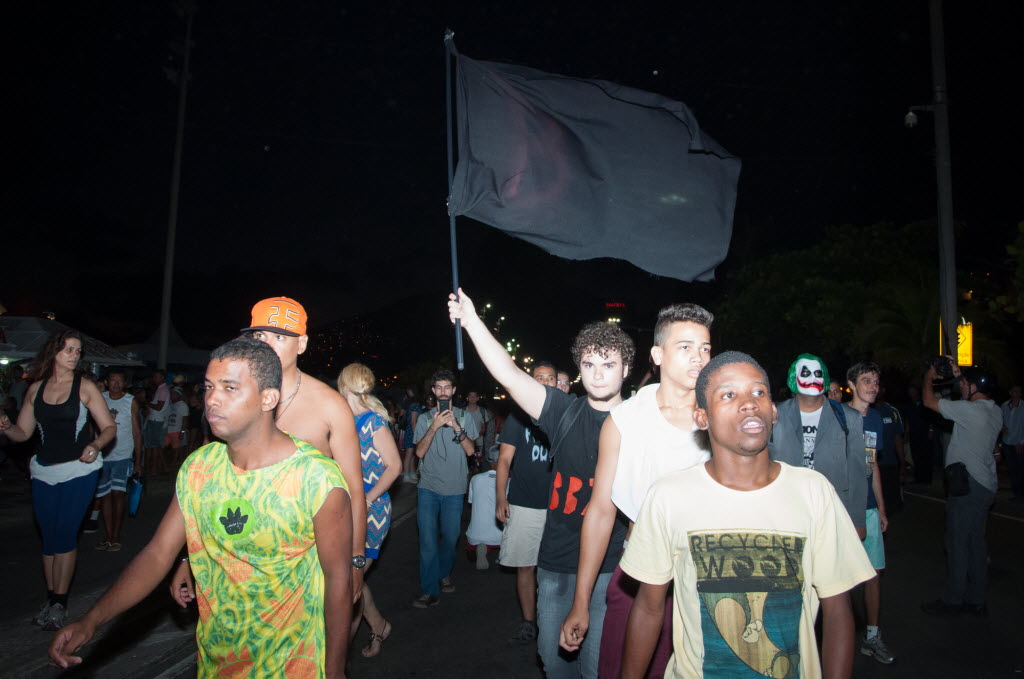“Apartheid” is too strong a word to describe Brazil’s serious class and race problems, says Mauricio Savarese. But it comes closer to describing the truth than the often-repeated claim that Brazil is a country without racism. Here, it’s not the state which is prejudiced. Above, youth at a planned ‘rolezinho’ in Rio de Janeiro.
By Mauricio Savarese
A few years ago a professor tried to get a sense of the social background of the students in my class. First question to his 45 pupils: “How many of you have been out of São Paulo?” Everyone raised their hands. “How many are working?” Fewer people raised their hands. That went on for ten minutes. In the end, two questions made one thing very clear: those seats weren’t for everyone. “How many of you went to one of our terrible public schools?” It was just me, and one other student. Everyone else in the room had studied at private schools.
“How many of you are black?” The other student was the only one to raise his hand. Things were different in all the other classes, in 2002, at one of Brazil’s best journalism schools.
There surely is racism in Brazil, and it could not have been any different for the last country in the Americas to abolish slavery. Things have improved, but this is the blackest place outside Africa and yet there are few Afro-Brazilians in politics, high corporate jobs or in the judiciary.
The flashmobs at São Paulo malls, known as “rolezinhos,” made all that prejudice self-evident: these people, young, mostly poor and black, will be discriminated against, even when all they are is heavy consumers trying to have some stupid fun.
All these things are pretty shocking. But they don’t seem to be enough for some. Since they need more convincing, they call it “apartheid.” They probably think there is a Brazilian Nelson Mandela somewhere in waiting. By comparing Brazil to a brutal regime that has taken decades for South Africans to dismantle, they find no difference between a democracy that needs fixing and a racial dictatorship that enforced their views through a wicked legal system. That kind of plagiarism is a new fad in Brazilian politics. Please, forgive us. Most of us can’t relate to suffering that took place overseas.
It is true that Brazil is much closer to “apartheid” than it is the fallacious “there is no racism here” claim. But our Supreme Court is headed by a black man, we do have affirmative action in universities and the outspoken hatred I saw twice in the London tube has no place here. We have a reasonably active national secretariat for racial diversity. We should be prosecuting more people for racist crimes, but the fact that notable racists are looked down upon is a sign that Brazil doesn’t have much to do with the officially racist South Africa that arrested Mandela.
In Brazil, the political and legal systems are fighting racism. But there is surely an issue with opportunities in the private sector and in political parties. There has never been a Brazilian Barack Obama, a black man leading a major ticket. Black CEOs? Only if they start the businesses themselves.
There are two other words that have become bucket adjectives in Brazil. People are allowed to use them freely, without any regard to what they actually mean: “fascist” and “populist.” It is probably better to deal with those when the presidential elections are upon us, come November.
Racism is big enough of an issue in Brazil for us to feel the need to use foreign words to make the concept more clear. Our challenges lie in reinforcing existing mechanisms to promote prosperous diversity. Or perhaps, in creating new ones so that the corporate and the political establishment can embrace Brazil as it is. Manipulating Mandela’s legacy won’t do us any good.
Mauricio Savarese is a Brazilian journalist, originally from Ipiranga, in São Paulo’s zona sul, and is the author of the blog, “A Brazilian operating in this area.” He was formerly a reporter in Brasília for UOL and is active on Twitter. Read his other thoughts on rolezinhos here.


